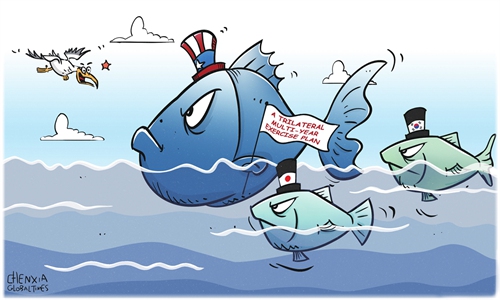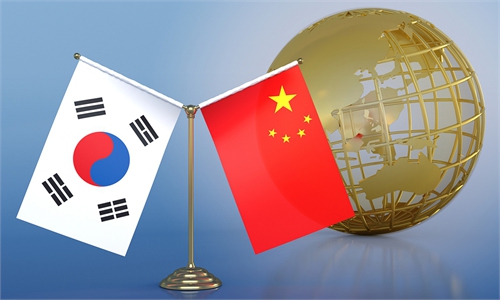
Illustration: Chen Xia/Global Times
US Secretary of Commerce Gina Raimondo and Ahn Duk-geun, the South Korean minister for trade, industry and energy, held a telephone conversation on Tuesday. In their conversation, Ahn expressed willingness to enhance industrial cooperation with the US and called for more support over the Inflation Reduction Act (IRA), CHIPS Act subsidies and other trade issues.Against the background of the intensifying US tech war against China and the uncertain prospects of globalization, perhaps Ahn has no better option in protecting South Korea's interests other than resorting to a "technological and advanced industrial alliance" with the US.
But the reality is the alliance cannot help boost local industry chains. On the contrary, the local economy may be hit by uncertainty if Seoul fails to prevent the US from driving a wedge into the supply chain between China and South Korea.
With the CHIPS Act and the IRA, which were signed into law by US President Joe Biden in 2022, US industrial policy in the new period is different from the past. Although it has long been a part of the industrial policy of the US that subsidies to companies are anathema to free and fair competition, government subsidies now have become the main focus, redefining US policies in the new age as protectionist policies aiming to stimulate domestic manufacturing development through unfair measures.
South Korean officials have asked the US to pay close attention to South Korean firms' concerns about the potential impact of the US subsidies, which are mainly given to enterprises that make products in the US.
If a "technological and advanced industrial alliance" with the US, as well as a lobbying effort by the South Korean side, can enable South Korean companies to enjoy more IRA and CHIPS Act subsidies, it will be beneficial for South Korean firms to ramp up production capacity and expand their manufacturing supply chain, especially in the fields of electric vehicles and chips.
But this is not the whole story. The purpose of increasing production capacity is to expand sales. Therefore, expanding the semiconductor manufacturing supply chain is just half of the story, and the other half is how to expand market share.
China is an important export market for South Korea, especially for its semiconductor industry. Without China's market, the significance of the US-South Korea industrial alliance to the South Korean economy will be greatly reduced.
In 2023, South Korea's exports to China plummeted by 18.7 percent from the previous year. According to media reports, South Korea's overall exports decreased 7.4 percent in 2023 amid sluggish chip sales. For all of 2023, semiconductor exports fell 23.7 percent to $98.6 billion.
The South Korean government said on Wednesday that it will step up efforts to boost exports of chips and automobiles by offering policy and financial support, aiming to achieve annual outbound shipments of $700 billion, according to local media outlets. This is very necessary.
In addition, a key issue is how to strengthen economic and trade cooperation with China, breaking down barriers created by the US in exporting cutting-edge chips and chip manufacturing technology to China.
Some South Korean companies have made significant investments in China, building competitive industry clusters. According to media reports, the US government agreed last year to allow Samsung Electronics and SK Hynix to supply US chip equipment to their China factories indefinitely without separate US approvals.
Under a "technological and advanced industrial alliance" with the US, South Korea should keep up its lobbying efforts to urge the US to stop using "long-arm jurisdiction" and abusing unilateral sanctions, allowing South Korean enterprises greater freedom to work with China's supply chain and sell their products in the Chinese market. For the South Korean economy, this may be more important than subsidies from the US.
The author is a reporter with the Global Times. bizopinion@globaltimes.com.cn



